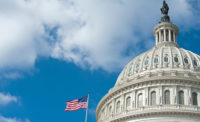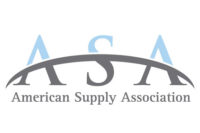The American Supply Association’s commitment to protecting its members’ best interests on the advocacy front was on full display recently in Napa, California where Lily MacKay, of public services consulting firm California Strategies, updated Western Suppliers Association annual meeting attendees on ASA’s legislative efforts in California.
ASA retained Cal Strat last year, and the firm continues to represent the association and our members on critical California issues impacting ASA members’ interests, particularly on those issues that will have significant impact nationally.
“For ASA, our work includes monitoring legislation that would be relevant, especially topics such as lead, clean water, lead pipes, decarbonization, electrification and labeling requirements,” MacKay said. “We provide updates on committee hearings, legislative deadlines, relevant regulatory or agency actions, and also represent ASA at all stakeholder meetings.”
In addition to advocating on the industry’s behalf on key issues in 2021 such as amendments to AB 100 (lead level requirements for certified endpoint drinking water devices manufactured and sold in California) and updates on Prop 65 (marking of items that may contain chemicals known to cause cancer or reproductive harm), MacKay brought Napa attendees up to speed on a variety of legislative and regulatory updates for 2022 thus far, including AB 1931 (lead pipe replacement) and SB 260 (greenhouse gas emission reporting for U.S.-based companies with revenues of more than $1 billion doing business in California), plus provided lead pipe regulatory and federal updates.
AB 1931 (by California Assemblymember Luz Rivas):
This bill addresses the lead pipe replacement issue in California by requiring a community water system to create an inventory of lead service lines in its distribution system, and creates a timeline for the replacement or removal of lead service lines that the community water system owns — with a deadline to submit the plan to the State Water Board by June 2023.
This is in line with the U.S. Environmental Protection Agency’s goal to replace all lead service lines as quickly as possible, “though the bill is drawing some industry opposition because of its aggressive timeline,” MacKay said.
MacKay noted the California Municipal Utilities Association claims this bill is duplicative of federal efforts and believes the sampling required in the bill (1 tap test and then 4 subsequent ones) is more extensive than what has been scientifically deemed necessary.
“We are continuing to monitor for ASA how discussions are going to see if amends will be adopted, and if not, we will consider whether or not we want to get more directly involved with meeting with the author and sharing our perspective on the requirements,” MacKay said.
SB 260 (by Senator Scott Wiener): This bill requires U.S.-based companies that do business in California and with revenues in excess of $1 billion to annually report, by January 1, 2024, their direct and indirect greenhouse gas (GHG) emissions from their operations and supply chain to the Secretary of State.
This bill further requires the California Air Resources Board (ARB) to develop regulations to guide that submission process, and to issue a report that estimates the emissions reductions necessary to maintain climate change below specified levels and make recommendations for how companies can achieve those reductions.
Lead pipe regulatory and federal updates:
MacKay noted there is a large push from the federal side to replace lead service lines. Besides AB 1931, EPA was given, in the Bipartisan Infrastructure Law, $15 billion (over 5 years) for the Drinking Water State Revolving Fund Lead Service Lines Replacement program.
For 2022, EPA released $3 billion of these funds, to be disbursed both via loans and grants – grants would go to communities that fall under the “disadvantaged community” definition (different in each state), MacKay added.
In California, SRF funds flow through the State Water Resources Control Board, MacKay explained. While these flow through the SWRCB, these are federal funds and do not require a state match. Further, under the law, 49% of the $15 billion are eligible for those funds via grant or 100 percent principal forgiveness loan.
“We will continue to see a coordinated push from the federal government and from state governments around the country for replacement of lead pipes,” MacKay said.



